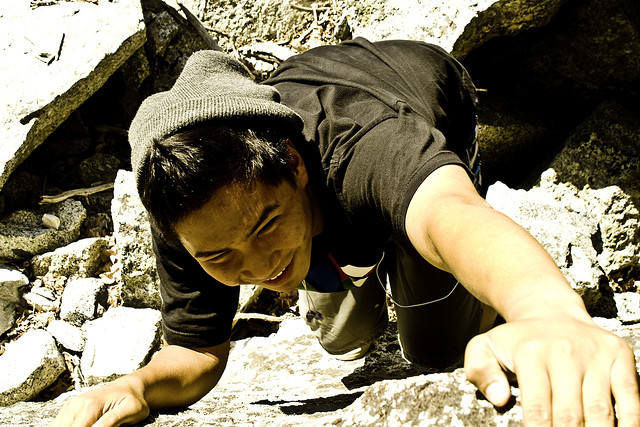
“If you get up one more time than you fall, you will make it through.” ~Chinese Proverb
Last year I had emergency open heart surgery. Shortly after the procedure, two nurses entered my room and gave me terrible news: I had to walk.
That may not sound like a big deal, but open heart surgery is brutal. Simple things like being able to sit up or change position once my backside became sore were agony. Getting to the walker, a mere several steps away from my bed, was an extreme effort.
My goal was to walk around the nurse’s station, and I might as well have been told to walk to the moon.
Despite a punctured lung (a surgical accident), I concentrated on regular deep breaths and slow deliberate steps. I was so focused on these two things that the pain, while still significant, slipped away.
By the time I made it back to my bed, I wanted to cry and laugh—I had made it!
The next day was very different, as I’d been having a difficult time. I couldn’t seem to muster the strength to get out of bed; finally, out of desperation, I cried and gasped out that I couldn’t do it. One of the nurses very firmly but compassionately told me I could.
With her help, I somehow managed to stand on both feet and stagger to the walker. As I made my tour of the station, the deep breathing and deliberate walking allowed me to calm down enough to cope with the pain and the severe depression I’d been battling.
It had hurt so much to move that morning, but once I stood up and took that first step, things started to get better.
From that moment on, I knew that I had the strength to conquer this physical challenge. I walked every day, right up until I was released. By far it was the greatest and most painful thing I had ever accomplished.
The stumbles and falls we suffer in life can be very much like physical ones. Have you ever actually fallen? Aside from the embarrassment, what thoughts ran through your mind?
Did you:
- Cry?
- Get back up faster than when you went down?
- Take a few moments to regain your senses before standing?
- Hit the ground so hard that you wondered how badly you were injured, but decided to try to stand up anyway?
- Blame someone else for making you fall?
- Discover that someone was offering a hand to help you back up? Did you accept it?
The down moments in life can cause us to react the same way—if, that is, we even recognize we’ve fallen. People often “hit rock bottom” yet continue the motions of living, denying problems that are piling up.
Knowing you’ve fallen is the first step. From there, how do you get back up? Here’s what I’ve learned:
Stop dwelling over circumstances.
Lamenting our poor choices and the faults of others won’t get us back on our feet. While it’s important to learn from these situations, it’s even more important to take these lessons to heart and not allow the past to root us down.
I could tell you about the years that led up to this surgery. I could spend a lot of time pointing fingers, even at myself. But I’d much rather talk about the positive changes I’ve experienced, and the joy I’ve found in day-to-day living. Our power is in the present.
Know what you’re capable of.
We generally know it’s harmful to stay in a bad situation, but sometimes we sabotage our attempts to leave. Setting goals that are out of reach not only create an environment ripe for failure, it feeds frustration and the sense of “I’m never getting out of this.”
What kind of goals are you setting? Are they realistic? Are they based on your capabilities, or someone else’s?
I wasn’t told to do my walking within a time frame. I wasn’t told I was supposed to handle it better because I was young. The nurses wanted to see just how much physical activity I was capable of.
When it was obvious that one trip around the desk was no longer a challenge, they asked if I’d like to make another round—and I did.
In the end, I got the pleasure of walking to the solarium where I could soak up the sun and watch the river. I really don’t think that would have been possible if my first goal had been anything more than simply “walk.”
There’s no shame in starting small. Sometimes it’s the best way to start.
Don’t let other people’s expectations dictate your situation.
What worked for a friend of a friend may not work for you. Have a conversation with yourself and understand what you can handle.
We really are different. Some people are better equipped—physically, emotionally and spiritually—to bounce back. Others need time, which can take days, months, or even years.
Don’t beat yourself up if it’s taking a long time to get up. We all have our own circumstances to deal with.
The most important thing isn’t that you bounce right back; it’s that you want to get back up.
Photo by japypen_g
About Dana David
Dana David is a Hodgkin’s Lymphoma and heart attack survivor who is currently working to invest positive energy back into her community. She is also a wife, avid reader, and is proudly owned by two cats. You can follow her @ivorynetsuke on Twitter.













 Though I run this site, it is not mine. It's ours. It's not about me. It's about us. Your stories and your wisdom are just as meaningful as mine.
Though I run this site, it is not mine. It's ours. It's not about me. It's about us. Your stories and your wisdom are just as meaningful as mine. 